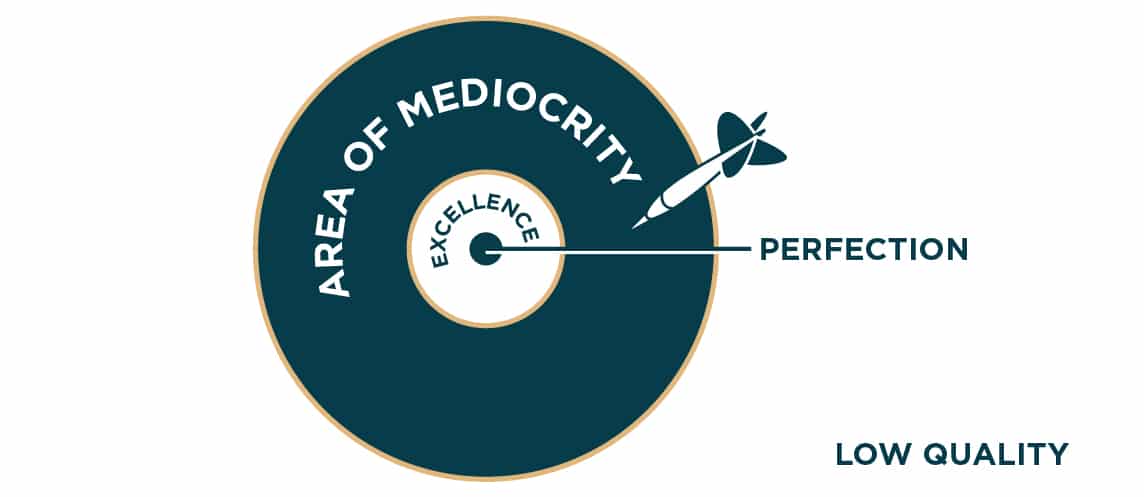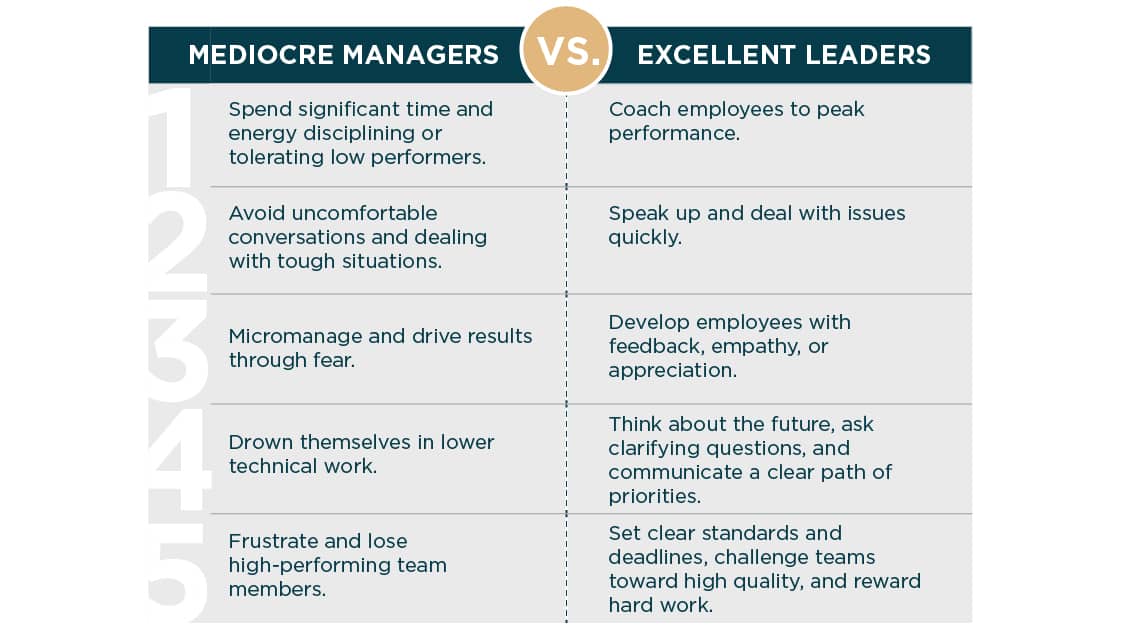Eradicate Mediocrity, Elevate Excellence
Are you frustrated by mediocre performance in your business? Do you want to build a more excellent business? Excellent means eminently good, superior, virtuous, and of valuable quality. Many companies commonly claim to embody these attributes, listing excellence as one of their core values. For those companies, quality goods and services are fundamental expectations. However, if we took a deeper look into their organization, would we find a thriving workplace culture? Blameless financial management? Respectful vendor relations? … Would you find that in your own business?
Contrary to excellence is mediocrity, which means of moderate or average quality, value, or performance. Mediocrity is all around us, from college admissions to job recruitment to politics. There’s a reason this phenomenon has been dubbed the “mediocrity trap”—it takes work to escape that frame of mind.
What are your typical expectations for quality when you learn something is “Christian”? Do you assume it is excellent? Though many Christian brands stand out for their service, product, ministry work, and market leadership, marketplace efforts by Christians often fall short of excellence in many areas. Each of our companies contributes to the greater reputation of Christian-led businesses. As appointed stewards, we should seek to eradicate perceptions of Christian mediocrity and aspire to surpass even good to operate at the highest degree of excellence possible. All of humanity bears God’s image, but Christians have a special duty to represent Him on this earth (Gen. 1:26–27). Peter says that we were chosen to proclaim Christ’s excellencies and to become “partakers of [God’s] divine nature” (1 Pet. 2:9; 2 Pet. 1:3–4). We are called to be His representatives in all that we say and do, which includes our work (Col. 3:17, 23; 1 Cor. 10:31).
Where have you detected that mediocrity has become the accepted standard in your industry? Where in your business does your “light shine” as excellence that sets you apart from your competition? When the quality of our work suffers, so does our representation of the One who saved us for great purposes.
Perfecting Our Aim
Philosophically, what is “good” or “excellent”? How is it seen and measured in a business? Our value of excellence can be expressed through words and symbols, but we know actions speak louder than words. What we believe is best expressed by our diligence and work quality. Metrics of quality in business include defects, rework, longevity, dependability, and serviceability. Scripture says “whatever” you do, work hard as unto the Lord (Col. 3:23–24; Eccles. 9:10). Tucked within every aspect of our business is an opportunity to reflect God’s character. One statement apocryphally attributed to Martin Luther puts it this way:
“The Christian shoemaker does his duty not by putting little crosses on the shoes, but by making good shoes, because God is interested in good craftsmanship.”
When we “make good shoes,” or in our case, build great businesses, we display the excellency of Christ to the world. Everything from our business cards to voicemails, meeting facilitation to the signage outside, matters because they all communicate who we are, what we value, and what others can expect from us.
Metaphorically, one way to think about quality is as a target. Landing somewhere on the board is fairly easy. Hitting the bull’s-eye, however, is much harder. With practice, focus, and consistency, our odds and results continually improve as our arrows move closer to the bull’s-eye. In our businesses, we can probably hit mediocrity without much effort, but it’s much harder to achieve perfection. Despite the difficulty, Christians are called to be like Christ, who is perfect (Matt. 5:48; Phil. 3:12). So, we aim for perfection and settle for excellence. (See Craig Groschel’s Global Leadership Summit 2019 talk “Bend the Curve.”

If business quality was illustrated on a target, we would aim for the bull’s eye of perfection but settle for excellence.
Building a Vision for Excellence
Great leaders hold great expectations, which they will not compromise. They have a destination in view and lead people toward that destination. Thus, vision plays a critical role in achieving organizational excellence (Prov. 29:18). To build high-performing cultures, great leaders set vision and expectations and never settle for less.
Horst Schulze, cofounder of the Ritz-Carlton Hotel Company, is renowned for setting high standards of service. In his book Excellence Wins, Schulze shares his visionary philosophies to be the best in business, highlighting the importance of ongoing reinforcement: “Because of a common commitment to high standards—reinforced on a continuing basis—the organization steadily moves forward.” Even as they experience success, visionary companies keep looking for and improving on hidden defects to move closer to true excellence.
Ten practices of visionary companies:
- Cast a worthy vision, purpose, and goals
- Adhere to enduring core values
- Operate according to a published strategic plan
- Persevere and focus relentlessly
- Oppose and overcome the status quo
- Commit to hiring and training for vision alignment
- Equip employees to articulate mission, vision, and values
- Inspire lifelong learning and innovation
- Cultivate a rich reservoir of internal talent
- Pursue available opportunities
According to the apostle Paul, excellence stems from a focus on what is honorable, pure, and commendable (Phil. 4:8). As Christians in business, the “worthy vision” and honorable, pure, and commendable purpose we can have is to use our businesses as tools for ministry. A BaaM (Business as a Ministry) mindset reminds us that our mission, vision, and values should transcend all that we do in the business. When we fall short of this integration, everyone must feel empowered and safe to call out that failure, even if that means challenging us as the leaders.
Indicators of Cultural Mediocrity vs. Excellence
The following comparison paints a picture of two different organizational cultures. One embodies the visionary practices outlined above and enjoys a flourishing culture of excellence. The other suffers with a mediocre culture because of mediocre leadership. Which list best describes the attitudes and activities within your organization?

Disillusioned with industry practices, President and C12 Member Cassandra Laymon, along with her team at Beacon Wealth Consultants, Inc., committed to applying biblical values of excellence to their business model. They have transformed their business into an industry leader and a model of good stewardship.
Shifting a Prevailing Perception
C.S. Lewis suggested, “The world does not need more Christian literature. What it needs is more Christians writing good literature.” We could adapt this quote to the marketplace by saying “We don’t need more Christian companies; we need more Christians leading excellent businesses as ministries!”
Mindsets like complacency, avoidance, and justification perpetuate workplace cultures of mediocrity. The price of fruitful Business as a Ministry is constant attention, unremitting effort, and commitment. The ease of complacency can allure leaders to disregard these important habits. But once leaders choose complacency, they perpetuate mediocrity in themselves and in their business as a whole. What behaviors or attitudes do you detect in your organization that reflect a culture of mediocrity? What actions can you take to help the company grow in integrity, excellence, and work ethic?
In Matthew 5, Jesus describes us as lights for His kingdom, created for good works that give glory to our Father. If our lives should look different because of Jesus, then our businesses should, too. Our call as buffalo leaders is to reject whatever lie or half-truth dominates the market and to align instead with God’s word. The light of our consistent excellence and high-level performance carries the power to cast out the darkness of a mediocre world.
____
Do you have peers who can help hold you accountable and counsel you toward greater personal and business excellence? Leaders in C12 groups meet each month to do just this.
July 6, 2021

